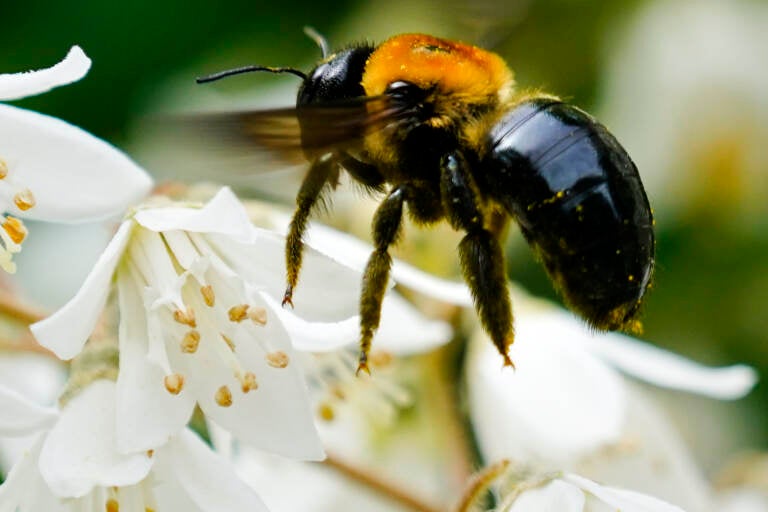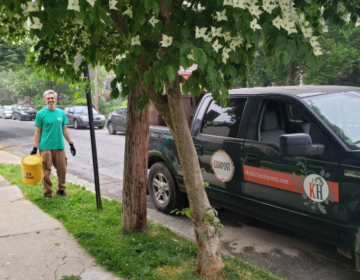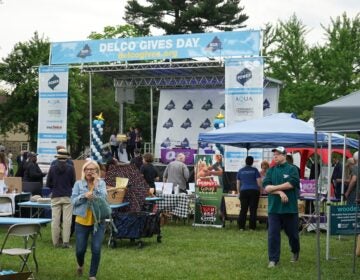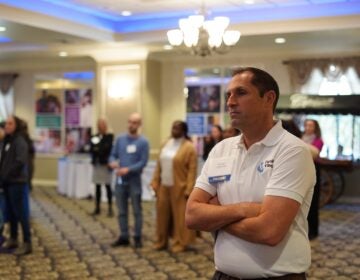‘We’re all abuzz’: Media Borough nationally certified as a ‘Bee City’
The national initiative designed to save the bees has found a partner community in Delaware County. Media wants other communities to follow in its steps.

A bee looks for nectar in a blossom in Glenside, Pa., Tuesday, June 1, 2021. (AP Photo/Matt Rourke)
Got a question about life in Philly’s suburbs? Our suburban reporters want to hear from you! Ask us a question or send an idea for a story you think we should cover.
Media Borough is now an official Bee City.
The municipality joined 300 towns, cities, and college campuses across the country on June 2 in protecting native bee species through Bee City USA, which is an initiative of the Xerces Society for Invertebrate Conservation.
“We’re all abuzz in Media,” said Mark Paikoff, a borough council member and the liaison to its Environmental Advisory Council.
Bee City USA provides partnering municipalities with a set of guidelines to transform their communities into a safe place for bees.
More than 3,600 native bee species call the U.S. home. However, that number is in freefall as nearly 40% of pollinator species across the globe face extinction. Habitat loss, pesticides, and the climate crisis are some of the main reasons for this dramatic shift.
The foundation of the initiative calls for partnering communities to plant native plants that are good for pollinators, provide nesting sites, reduce or eliminate pesticide usage, and help spread the word.
Media’s participation in the bee-saving program is the result of the advocacy work of Linda Coulston, a member of Transition Town Media and its Protecting Biodiversity Group.
The organization’s goal is to reduce the borough’s carbon footprint, while also building community. In July 2021, members of the group had a hand in helping Media debut its municipal-wide composting program.
A transition to saving the bees was a logical next step.
“I would like to see every community in our country be part of the city. There’s a drastic decline in the insect population and also the bird population,” Coulston said.
As part of the application, communities must agree to create a pollinator habitat and adopt an integrated pest management plan to help them reduce their pesticide usage on land that’s on municipal properties. On top of that, there is also a commitment to conduct pollinator conservation outreach.
“I believe that by being a Bee City, we’ll be able to educate the residents of Media,” Coulston said.
On the government side of things, local officials have to agree to pass a Bee City-approved resolution.
Coulston first presented the idea to the borough’s Environmental Advisory Council toward the end of February. The group was pleased with the concept, so she was invited to speak with the borough council.
From there, the borough pulled together a resolution and approved it in April. The borough sent in its official application in May. It only took about a month for Media’s application to Bee City USA to get the green light.
“That’s lightning-fast for us,” said Laura Rost, a Bee City USA and Bee Campus USA coordinator.
Bee City USA is celebrating its 10th anniversary this year. Rost said a lot of groundwork goes into becoming an affiliate — but in the end, it’s all worth it.
“Even a small bit of habitat can really make a difference for bees, and especially in urban areas, habitat may really be at a premium,” Rost said.
She added that the nice thing about an initiative like this is how it spreads by “word of mouth, neighbors talking to neighbors, and cities talking to other cities.” Rost said it is a true grassroots effort.
“You start to see the momentum and the growth as more people hear about the program and get involved and see the successes of their neighbors. They see ways that they can create their own pollinator habitat and create their own initiatives that are reflective of their community,” Rost said.
Allentown Borough, Moorestown Township, and the city of Buena Vista in New Jersey have all become Bee City affiliates in the past few years. The Dover, Delaware campus of Wesley College, which was acquired last year by Delaware State University, was also a Bee Campus affiliate.
According to Paikoff, Media has always been a regional leader in tackling environmental issues despite being a small borough of roughly 5,700 people living on 487 square acres of land.
“We want to be sort of a guiding light in Delaware County to help other communities, develop processes and other types of programs that will allow them to make their communities more environmentally friendly — to make them more resident-friendly,” Paikoff said.
However, he added that individual residents must lead the way. He credits Coulston for pulling this together.
She said that the work is just beginning. The borough is still awaiting its Bee City USA welcome package that will allow it to begin disseminating materials to residents.
“Convincing people to do a little bit extra, I think, is going to help increase the numbers or at least help to forestall any decrease in numbers of our invertebrates and therefore birds,” Coulston said.

Saturdays just got more interesting.
WHYY is your source for fact-based, in-depth journalism and information. As a nonprofit organization, we rely on financial support from readers like you. Please give today.







